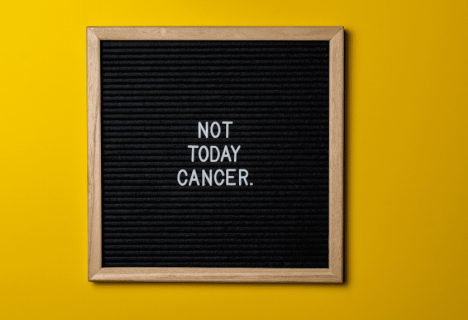Annabelle Shaffer, BS, Master’s candidate in the Division of Nutritional Sciences at the University of Illinois Urbana-Champaign.
What is Cancer?
At its most basic level, cancer is an abnormal growth of human cells (1). Cancer development is associated with several factors: family history and genetics as well as lifestyle factors such as smoking, alcohol overuse, diet and weight, and environmental exposure, like sun tanning (2, 3). Family history is a non-modifiable risk factor, but we can reduce cancer risk through modifiable risk factors, such as by following a healthy diet. [12] In the news, we often hear that a single herb, like green tea extract, or fruit is capable of preventing cancer. Unfortunately, there is not enough evidence to recommend a supplement or food as a means of cancer prevention (4). Rather than a specific food, we should focus on following an overall healthy diet and lifestyle.
Following an Overall Healthy Diet
Consuming whole grains, fiber-rich foods, low-fat dairy, and maintaining a healthy weight decrease the risk of certain cancers (5). It is also important to reduce “fast food” and processed meats (5, 6). We can do the following to minimize weight gain, simultaneously preventing cancer (5):
- Mediterranean-type diet: Simply put, a Mediterranean diet is rich in fruits and vegetables and modest in meats and dairy. When consuming meats and dairy, look for lean meats, like chicken breast and low-fat dairy products.
- Does organic matter? There are no large randomized controlled trials to support the need for organic produce. No significant associations between consuming organic products and cancer have been found (7, 8). Focus on adding fruits and vegetables to your diet, regardless of their organic status.
- Dietary fiber: Dietary fiber promotes fullness and also boosts our colon health. We find fiber in fruits, vegetables, whole grains, and nuts and seeds.
- Fruits: Aim to consume whole fruits rather than juices. Eat the skin when possible for extra fiber.
- Vegetables: Consume vegetables that are raw, boiled, or steamed. Avoid fried vegetables, such as french fries, which contain excess fat.
- Whole grains: Switch to 100% whole wheat bread and pasta. Try brown rice or quinoa instead of white rice.
- Nuts and seeds: Try adding flax or chia seeds as a crunchy salad topping. To reduce excess salt and fat, look for raw or toasted nuts.
Maintaining a Healthy Lifestyle
Key modifiable risk factors of cancers include smoking and tobacco usage, alcohol overuse, and excess sun exposure (2). We can take steps to reduce these risk factors every day.
- Smoking/Tobacco Usage: Tobacco can damage our cells leading to uncontrollable growth and possible cancer (9). Immediately after quitting smoking, we see positive cardiovascular benefits, like reduced blood pressure. After two years, the risk of cancer in the mouth, throat, esophagus, and bladder reduce by 50% (10)! The National Institutes of Health (10) offers several resources, including mobile apps and social media initiatives, for quitting smoking via SmokeFree.gov.
- Alcohol: Heavy drinking is an established causing factor in some cancers, such as liver or colon (11). By drinking in moderation, defined as one drink/day for women and two drinks/day for men by the Dietary Guidelines for Americans, we reduce the risk of alcohol-related health problems (12). One drink is equal to 12 oz. beer, 8 oz. malt liquor, 5 oz. wine, or 1.5 oz. of hard liquor (12). If you or a loved one need resources to reduce/quit drinking, visit the NIH’s Alcohol Treatment Navigator.
- Sun Exposure: Ultra-violet radiation, from the sun, can harm our skin by damaging skin cells’ DNA, or the cell’s instructional blueprint (2, 3). When the cell’s DNA is damaged, it may reproduce uncontrollably, resulting in skin cancer. Even though ultra-violet radiation is a small portion of sunlight, it is best to avoid excessive sun exposure. We can reduce exposure by staying in the shade, wearing full-coverage clothing and a hat, wearing sunglasses that protect against UVA and UVB rays, avoid tanning beds, and using sunscreen with at least 15 SPF (3, 13).
There is no magic bullet to prevent cancer development. However, we can make small changes to improve our diet and lifestyle to potentially prevent certain cancers.
References:
1. Hanahan D, Weinberg RA. Hallmarks of cancer: the next generation. Cell. 2011 Mar 4;144(5):646-74.
2. Whiteman DC, Wilson LF. The fractions of cancer attributable to modifiable factors: A global review. Cancer Epidemiol. 2016 Oct;44:203-21.
3. ACS. Ultraviolet (UV) Radiation. American Cancer Society: The American Cancer Society medical and editorial content team; 2019 [cited 2020 May 20]; Available from: www.cancer.org/cancer/cancer-causes/radiation-exposure/uv-radiation.html.
4. Vernieri C, Nichetti F, Raimondi A, Pusceddu S, Platania M, Berrino F, et al. Diet and supplements in cancer prevention and treatment: Clinical evidences and future perspectives. Crit Rev Oncol Hematol. 2018 Mar;123:57-73.
5. Fund WCR. Diet, Nutrition, Physical Activity and Cancer: a Global Perspective. A Summary of the Third Expert Report. 2018.
6. Wiseman MJ. Nutrition and cancer: prevention and survival. Br J Nutr. 2019 Sep 14;122(5):481-7.
7. Baranski M, Rempelos L, Iversen PO, Leifert C. Effects of organic food consumption on human health; the jury is still out! Food Nutr Res. 2017;61(1):1287333.
8. Bradbury KE, Balkwill A, Spencer EA, Roddam AW, Reeves GK, Green J, et al. Organic food consumption and the incidence of cancer in a large prospective study of women in the United Kingdom. Br J Cancer. 2014 Apr 29;110(9):2321-6.
9. Samet JM. Tobacco smoking: the leading cause of preventable disease worldwide. Thorac Surg Clin. 2013 May;23(2):103-12.
10. NIH. Reasons to Quit. SmokeFree.gov [cited 2020 May 14]; Available from: smokefree.gov/quit-smoking/why-you-should-quit/reasons-to-quit.
11. Boffetta P, Hashibe M. Alcohol and cancer. Lancet Oncol. 2006 Feb;7(2):149-56.
12. CDC. Dietary Guidelines for Alcohol. CDC2019 [updated 12/30/19; cited 2020 May 14]; Available from: www.cdc.gov/alcohol/fact-sheets/moderate-drinking.htm.
13. CDC. What Can I Do to Reduce My Risk of Skin Cancer? CDC2020 [updated 4/9/20; cited 2020 May 14]; Available from: www.cdc.gov/cancer/skin/basic_info/prevention.htm.
Photo from Canva.















